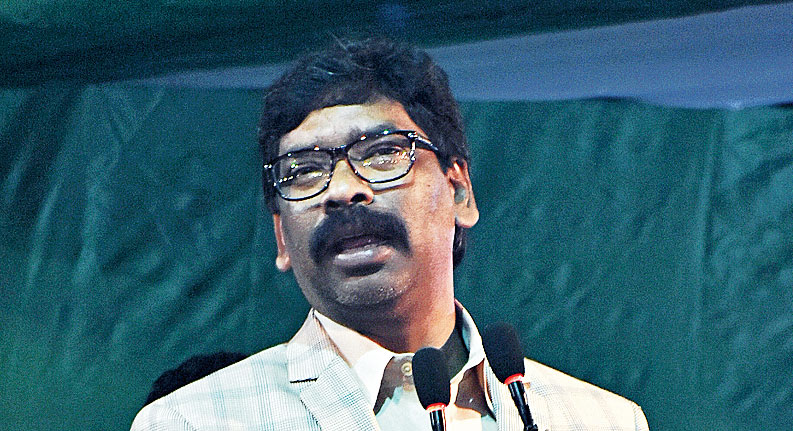Intellectuals have welcomed the move of Jharkhand chief minister Hemant Soren to seek the inclusion of three major tribal languages of the state in the Eighth Schedule of the Constitution.
Soren wrote to Union home minister Amit Shah on Saturday requesting him to include Mundari, Ho and Kurukh languages spoken by Munda, Ho and Oraon communities respectively, in the Eighth Schedule.
Jharkhand has already recognised them as second official languages of the state and is committed to their development, Soren said in his letter.
Among the four major tribal languages of the state, Santhali, which is also spoken by the Santhal community in other states such as Bengal, Odisha and Assam, was included in the Eighth Schedule in 2003.

Vendors beat utensils to press their demand for permission to open their outlets in Ranchi on Monday. PTI
“Inclusion in the Eighth Schedule gives a language a national status that helps in a number of ways,” said Hari Oraon, head of tribal and regional languages department of Ranchi University.
“Once a language is included in the Eighth Schedule, the Sahitya Akademi also recognises it and promotes literary activities in that language, besides giving awards that helps in creation of good and recognised literary works,” he said.
“Once done (including the languages in the Eighth Schedule), the youths of the state who aspire to join civil services are also likely get a chance to opt for one of these languages as a subject in the UPSC examinations,” he added.
“The scope for children to continue studies in these languages will increase significantly, facilitating chances for educated youths to get employed as teachers in these languages, as it happened in the case of Santhali,” said Krishna Devgam, a Chaibasa teacher who speaks Ho.
“Yes, recognition surely helps promote good literary works. I wish these languages were also included in the Eighth Schedule," said Madan Mohan Soren, a Santhali writer and a member of the Sahitya Akademi.
“The Akademi offers four literary awards every year and that certainly encourages the writers,” said the Jamshedpur-based writer. The awards are given for overall best literary work in the language, best work by a young writer, best translation work and best children’s literature, he added.
“Inclusion of these languages in the Eighth Schedule will help the tribals shrug off the feeling of backwardness and instil in them a sense of confidence,” said Mahadev Toppo, a Hindi writer who speaks Kurukh.
“By not pursuing studies in their mother tongue, the tribals have been mostly alienated from their own languages,” he said, adding the recognition of a scheduled language will immensely help in the revival of tribal culture.
“Now many have started appreciating ethnic dresses and tribal food habits,” Toppo said.
“More such things would flourish when the traditional wisdom of the tribals spread in their folktales and folklores are revealed through research and publication in their own languages,” he said.
Asked why the second official language status in the state could not yield the desired results in promoting these tribal languages, the intellectuals said some progress has been made but there could have been a gap in planning and its implementation.










